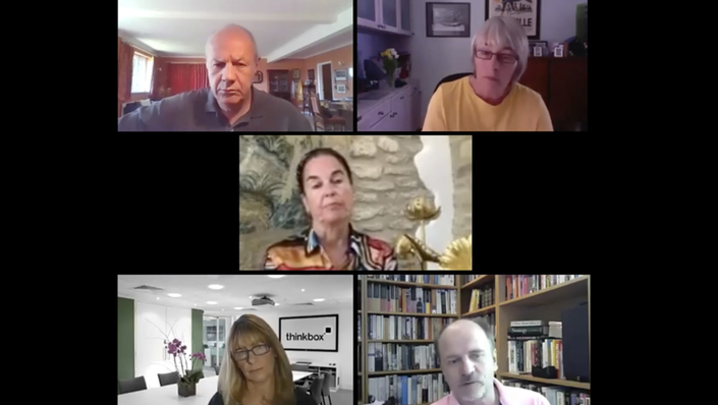As Covid-19 supervisors become commonplace on set, Tim Dams learns how producers are keeping the cameras rolling.
The show must go on” runs the showbiz saying, but even this old cliché has been turned on its head by the Covid-19 pandemic. Numerous dramas have temporarily halted production in recent months following Covid outbreaks among cast or crew. Sky thriller Cobra, for example, started shooting its second season at the end of September, but returned from the Christmas break to find that 15 of its cast and crew had tested positive for Covid.
Meanwhile, the third season of Britannia has just wrapped, nearly a year after it first went into production, in March 2020. The Sky original closed down two weeks later due to the first lockdown, then restarted in September but had to halt for a week amid positive Covid tests.
Other productions have delayed shooting during the winter’s horrifying second Covid-19 wave. Conversations with Friends, the BBC follow-up to its hit Sally Rooney adaptation, Normal People, pushed production from January to spring. Channel 5 and Acorn TV detective drama Dalgliesh moved from January to March.
Charlie Pattinson, CEO of Cobra and Dalgliesh producer New Pictures, says it has been important to display “ultra-caution” over production during the pandemic. “The show business ethos that, whatever happens, the show must go on, and you just struggle on, no longer applies.”
Programme-makers say that the industry’s Covid safe shooting protocols, agreed last summer, in combination with the Government-backed £500m Film and TV Production Restart Scheme, have been key to restarting production.
What began as a trickle last summer has become something of a flood. So far, more than 160 productions across the UK have been approved by the Restart scheme, which has been extended to cover productions that start shooting before the end of April.
Pattinson describes the scheme as a “vital safety blanket”, albeit an expensive one. “It’s also quite unwieldy. We’re not planning on making a claim under it, despite the fact we have lost a couple of days.”
Pattinson says a “rigid adherence” to the Covid production protocols has been important for keeping people not just physically safe, but also in good mental health.
Cast and crew rightly felt “very fragile” around the New Year, when hospitalisations and deaths were peaking. “What people want to know is that we have their best interests at heart – that their health takes precedence over our schedule.”
Among all the Covid protocols, producers say regular testing has been critical to ensuring a smooth filming schedule, and to allaying the worries of cast and crew.
Conversations with Friends indie Element Pictures, for example, is one of several productions to have its own, fast-turnaround coronavirus testing lab on-site. “We’re definitely erring on the side of caution,” says Element co-founder Ed Guiney.
A Covid-19 supervisor has also become a familiar presence on sets to oversee safety precautions.
All high-end dramas need to have a Covid-19 supervisor. They carry out risk assessments with the health and safety manager and on-site medic, oversee the implementation and monitoring of Covid-19 safety controls, and have the authority to stop unsafe working practices.
Covid-19 supervisors might come from a dedicated health and safety background or be a trained crew member who then works in a dual role. To help meet demand for Covid supervisors, the Production Guild of Great Britain (PGGB) and the British Film Commission (BFC) partnered last year to develop a new programme of Covid supervisor training for film and TV, targeted at production managers, line producers and location managers.
“It’s a full-time job,” says Kenton Allen, CEO of Big Talk, which is currently shooting Stephen Merchant’s The Offenders in Bristol for BBC One and Amazon Prime Video.
Like many other executives, Allen is unable to visit the set of his own show. “They’re running a Covid-secure environment. Jumping on a train to Bristol and going on set is a no-no, I’m afraid. One needs to lead by example, and that would be setting a bad example.”
However, a Covid supervisor gives people such as Allen “the confidence that it is all being done correctly to support the producers – it is essential”.
Indeed, complex Covid safety protocols now reach into every corner of production, including: twice-weekly PCR testing for all working within close-contact bubbles; limiting the numbers on set; crew working two metres apart; departments split into smaller sections; and the ubiquitous mask wearing, extra washing and sanitisation facilities.
Inevitably, Covid has also made production itself more complex. Big Talk, for example, has built more sets for The Offenders at Bristol’s Bottle Yard Studios to give production more “controllable environments”, explains Allen.
Element has also built more sets in Belfast for Conversations with Friends. “We’re shooting on an awful lot of stages,” confirms Guiney.
Not only does this make it easier for a production to adhere to Covid guidelines, it also means that a shoot can keep away from the public.
It’s still very challenging to be out on the streets with a crew, particularly in residential areas, says Allen. “Crew are having to deal with, on occasions, some quite reactionary behaviour from members of the public,” he explains.
Studios also give productions more shooting flexibility if a location suddenly become unavailable, as happened to Cobra. It lost a major location – a seafront town in the North West – early on in production. The local council, says Pattinson, was so occupied with dealing with Covid that it, understandably, “couldn’t get its head around 20 or 30 people coming in to film”.
International travel has been the other big headache. Few have opted to shoot abroad in recent months, with notable exceptions including Around the World in 80 Days, starring David Tennant, which restarted filming in November in Romania and completed in South Africa this year.
“International filming is difficult,” agrees one producer. “I know people who are shooting in Budapest at the moment. It’s pretty unpleasant – everyone is locked up in their hotel room for most of the time.”
Even transporting international talent to the UK is difficult, and expensive. Big Talk, for example, is flying The Offenders star Christopher Walken by private jet, rather than using a commercial airline, from New York to the UK for the shoot, after which he will isolate and be tested ahead of filming. “We have a duty of care to an extremely brilliant actor to get him here in as safe a way as possible,” Allen explains.
For those international stars who do make it here, there are still challenges, though. Cobra star Robert Carlyle – who lives in Vancouver, Canada – flew over ahead of production in September. He was unable to return home to his family over Christmas during a two-week break because he would have had to quarantine on the way out and the way back. He spent Christmas on his own.
“He’s been amazing,” says Pattinson. “But whether he’d do that again, I don’t know.”
Asked if there is anything about making TV shows in Covid times that programme-makers would like to adopt for the future, few can identify any positives. “The shooting process has been pretty well designed over the past 70 to 80 years,” says Allen. “I don’t think Covid has taught us anything we’d like to carry on in the future.”
Covid restrictions have added to the time and expense of production, note production companies, with many citing a 15% to 30% rise in costs. The social distancing and mask wearing “also take quite a lot of the fun out of it”, says James Richardson, co-founder of Britannia producer Vertigo Films. Having steered Britannia through nearly a year of Covid-interrupted production, his advice for producers is: “Don’t be daunted by it.” Everything that producers do is about solving problems, he says.
Richardson had two guiding parameters for Britannia: could the cast and crew still do their best work? Was everyone safe? “If the answer to those two questions was yes, then I felt we could carry on going.”
Looking ahead, most producers are optimistic about the coming months, predicting buoyant levels of production as the vaccination programme accelerates and social-distancing measures ease. “I don’t feel that these protocols are going to go away quickly,” says Pattinson. “But I feel as though it’s got to get better.”
It can hardly get more difficult than shooting during January, at the peak of the pandemic, when one in 50 people had Covid-19 in the UK. “The industry has been pretty amazing working through this,” says Pattinson. “I don’t think you can underestimate the anxiety levels. People were incredibly brave.”




